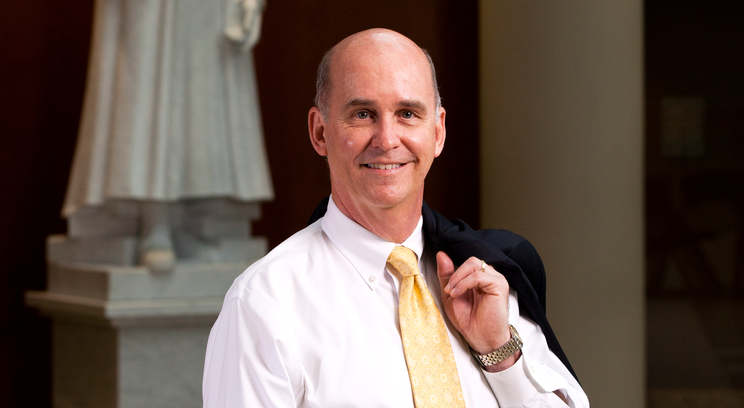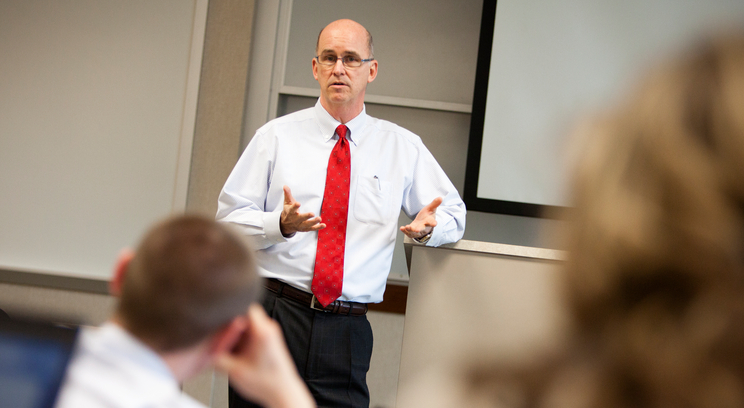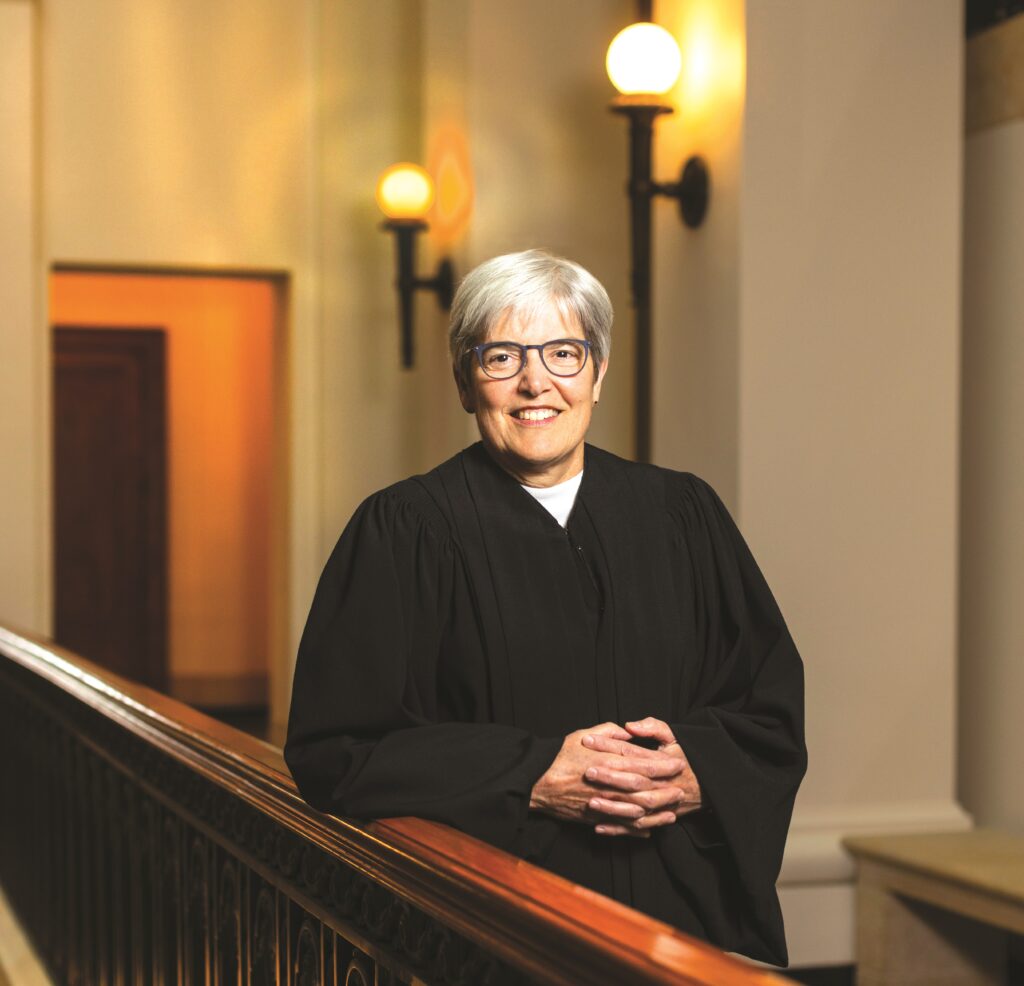There is a long list of milestones marking the accomplishments of Dean and Ryan Chair in Law Thomas M. Mengler as he steps down to take the presidency at St. Mary’s University in San Antonio, Texas. The milestones are important, and have continued to build up the strong foundation of the School of Law, but what is remarkable is the depth of feeling that the community has for Mengler, or as he has become to so many simply one word, “Tom.”
During the spring, several members of the community contributed to a farewell video for Mengler. Students gathered for a class photo and composed a book of remembrances. The message was amazingly consistent. Almost everyone said “Thank you,” tinged with a note of “Don’t go.”
Mengler joined the University of St. Thomas School of Law as the second dean in June 2002 for the school’s second academic year. He presided over the opening of the School of Law building, and the first commencement. His leadership was critical in the new School of Law achieving American Bar Association accreditation early, in February 2006. Dedicated to the school’s mission to “integrate faith and reason in the search for truth through a focus on morality and social justice,”
Mengler helped build a unique law school culture at the University of St. Thomas. As the student body increased in size, the mission remained central, and students, faculty, and staff responded enthusiastically. Princeton Review ranked the School of Law first through fourth among more than 175 law schools for Student Quality of Life, between 2005 and 2010. In 2011 the publication named the faculty to the list of “Best Professors.” During the same time, the school entered U.S. News and World Report Law School Rankings in the third tier (out of four tiers) in spring 2007. Only 3 out of 23 new law schools have entered these rankings in the 3rd tier or above. Mengler also helped attract and lead a talented group of faculty, who in 2010 ranked 38th out of 200 for scholarly impact.
Just last fall, the School of Law passed the $100 million mark in total gifts to the law school as it celebrated its 10th anniversary. Gifts and pledges to the School of Law during the University of St. Thomas’ current capital campaign now exceed $30 million, and include establishing endowments to support seven faculty chairs or professorships; student scholarships; establishment of the Murphy Institute for Catholic Thought, Law, and Public Policy; and establishment of the Holloran Center for Ethical Leadership in the Professions.
Demonstrating his impact not only on the School of Law but also in the Twin Cities legal community, in September 2008, Mengler was selected by Minnesota Lawyer as one of Minnesota’s “10 Legal Newsmakers of the Decade.” The others selected include U.S. Sen. Amy Klobuchar, former U.S. Sen. Norm Coleman, former Gov. Tim Pawlenty, and two former Chief Justices of the Minnesota Supreme Court.
Mengler’s 10 years as dean was the next step in an impressive career. After graduating from Carleton College in Northfield, Minn., he earned an M.A. in philosophy at the University of Texas. He went on to earn his J.D. from the University of Texas School of Law; there he served on the Law Review and was awarded Order of the Coif at graduation. After law school he clerked for Judge James K. Logan, U.S. Court of Appeals for the 10th Circuit in Kansas, before becoming an associate at Arnold & Porter in Washington D.C. The final stop before entering academe was as an Assistant Attorney General in Texas.
Mengler joined the University of Illinois College of Law in 1985 as an assistant professor of law. He rose through the ranks at the University of Illinois eventually becoming Dean of the College of Law. During his tenure at Illinois he also served as Interim Provost and Vice Chancellor for Academic Affairs. Before leaving the University of St. Thomas School of Law for his presidency at St. Mary’s University, Mengler reflected on what brought him to the School of Law, some of his best memories and the challenges facing the legal profession and legal education in the future.
How important has the mission been to you at the School of Law?
It’s everything. Several things drew me to the School of Law – the opportunity to help build a law school from the ground up, the Trustees and Father Dease’s pledge to establish over time a national law school, the enormous resources that generous benefactors had already donated. Above all, however, the unique mission drew me and my wife Mona to leave the University of Illinois and move northward.
And, without question, the mission has been a key to our success. Outstanding faculty members have left other fine law schools to come here for the mission. We have recruited excellent staff and the best of them have remained here, turned down more lucrative offers elsewhere, because of the mission. And our talented students too, an incredibly mature and centered group of mostly young men and women, have enrolled here for the mission.
As we have over time come to understand and embrace it, the mission is fundamentally about the formation through faith and community of young men and women committed to leading purposeful lives as legal professionals. This mission has guided our big and small decisions. It has changed all of us – not just our students – but faculty, staff, graduates, and Board members.
What do you remember about first becoming interested in the position of Dean at the University of St. Thomas School of Law?
Some of you have heard me tell this story before. I remember most Professor Neil Hamilton’s gritty determination to recruit me. Neil was chair of the search committee, and he was relentless in his efforts to interest me in the position.
I tried to ignore his early calls, because initially I could not imagine leaving the University of Illinois for an unaccredited law school in Minnesota.
When we finally spoke, I recall, and so does Neil, this conversation: “Neil, did you know I am Catholic?” “Yes, we know that.”
“Neil, did you know that I have prior connections to Minnesota?” “Yes, we know you graduated in 1975 from Carleton College.”
“But I bet you didn’t know my wife is originally from Texas, and Minnesota is going to be way too cold for her.”
“No, we didn’t know that.”
Still Professor Hamilton doggedly continued to call or email me. Finally, Neil asked me if I would agree to meet with President Dennis Dease. That was the beginning, my initial discussion with Father Dease and a few other individuals.
What individuals do you first remember meeting?
Some excellent folks, all of whom played crucial roles in the establishment of this great law school. Father Dease, who told me when we first met that the School of Law would be his legacy. Associate Dean Patrick Schiltz, now United States District Judge Schiltz, who almost single-handedly undertook and completed the essential early work. Quent Hietpas, who played an instrumental role in raising more than $70 million for the School of Law prior to my arrival. Tom Holloran and Sister Sally Furay, both of whom embody the highest values of what we are trying to instill in our students.
What is your best memory of your time at the School of Law?
Without question, my favorite memory is when I pretended to be Oprah Winfrey and somehow persuaded a sizeable percentage of the St. Thomas student body, and many of my faculty and staff colleagues, that the Mystery Speaker for the day was going to be Oprah Winfrey. The
Schulze Grand Atrium was packed with hopeful people as it had never been before. Unspeakable disappointment ensued when I, not Oprah, showed up. A small part of the disappointment was mitigated when I announced that we had just become fully accredited by the American Bar Association. That helped some; but there were a lot of people who felt duped. The editor-in-chief of the Law Journal didn’t speak to me for weeks.
This was also the first time we shot confetti from the fourth floor of the Law Building onto the floor of the Atrium. That was almost as much fun as fooling virtually the entire law school community.
What is your proudest accomplishment as dean of the School of Law?
A law school culture that rewards academic excellence in teaching and scholarship, innovation and teamwork, and that inspires faith in God, community, service, and respect for everyone who is involved in the law school, whatever their roles.
What will you miss about living in Minnesota?
The deep and enduring friendships my wife, Mona, and I have enjoyed. Fires in our fireplace on cold winter evenings. The beauty of early morning after a snowy night. The School of Law, its people and its spirit.
What external factors shaped the School of Law during your tenure that were particularly challenging or surprising?
As a Catholic law school with a serious religious mission, one of the biggest challenges for us, ten years ago, today, and in the future, is the level of hostility and skepticism with which the academic world, including the legal academy, views a religious institution.
We have done our very best to be a law school that embraces non-Catholics as well as Catholics, people of no faith as well as people of intense religious faith. We believe very strongly that we have added an important dimension, enhanced the diversity of perspectives, not narrowed the focus or restricted viewpoint. And I think we have succeeded in becoming that kind of law school. But the secular academy views us with suspicion, like most institutions that seek to maintain a spiritual dimension.
We have responded, and no doubt will continue to respond, through our best ambassadors for what we have established here – the men and women who are our successful graduates.
As you became dean you wrote a piece called, “What’s Faith Got to Do With It?” In the past several years has your answer to that question changed?
By the way, I still apologize to Tina Turner for modifying the title of her best song. When I wrote that little essay in fall 2002, I had just left a public law school, the University of Illinois College of Law, and just arrived at this new Catholic law school. In a later article, I wrote that when I first arrived at the School of Law, I could barely form the right words to talk about our Catholic identity. I had no true vision about how one might support and nurture the whole person at a Catholic law school. As I wrote some years later, “I was like a puppy dog, eager to please his master but entirely clueless about how to go about it.”
Since fall 2002, my understanding of our mission has changed radically. Then, in that essay, I focused on mentoring and service to community – both of which are still important parts of our mission. But there is something more basic, almost ineffable, about this great law school. Over the years I have come to understand – or more accurately, feel – the fundamental importance of the relational – of living in community with individuals of faith who are seeking to lead purposeful lives. Our mission, if properly lived, is as much about the heart as the mind, as much about the unspoken daily kindnesses as the spoken message. Mother Teresa said it best: “Be faithful in small things, because it is in them that your strength lies.”
What do you see the key challenges will be to the legal profession in coming years?
Let me begin by stating that I am proud and privileged to be a lawyer, and that one of my joys over the last ten years has been to get to know and work in Minnesota with some of the finest lawyers and judges in America. The Minnesota bench and bar is first-rate in terms of its overall competence, and more important, in terms of its professionalism and dedication to service to client and community. I guess the key challenge for all of us in the legal profession is to remember that we are blessed with the treasure of a law degree, to responsibly serve clients and to work in our communities to effect positive social change. Not enough members of the legal profession remember that we are charged with this calling.
What are the key challenges to legal education in the coming years, and how do you feel you are leaving the School of Law to meet those?
No doubt these are truly rocky times for legal education, just as they remain rocky times for many who are trying to eke out a living in an economy that still is floundering. The rising cost of legal education is a huge challenge, even after our economy bounces upward and creates more legal work and more positions. I think the significant fundraising that many of us have undertaken for the School of Law – more than $100 million now – will mitigate those costs to some extent for our students in the coming years. I also think a continued focus on keeping expenditures down – as we have been doing over the past years here – will also be critical.
There will be a lot of competition out there and a real need for attorneys who can play the larger role of trusted advisor to clients. The School of Law, through its mentor program, its courses on leadership, the values that it embodies within this community, will continue to graduate lawyers who possess those soft skills and values that will be necessary to succeed in the legal profession.
What is your greatest wish for the future of the University of St. Thomas School of Law?
After 10 years as dean, I only get one wish? OK, here’s my wish: I believe so strongly in the mission and vision of this law school that I pray that it eventually takes its rightful place as the model for American legal education.
Read more from St. Thomas Lawyer





